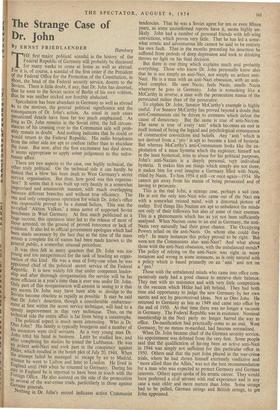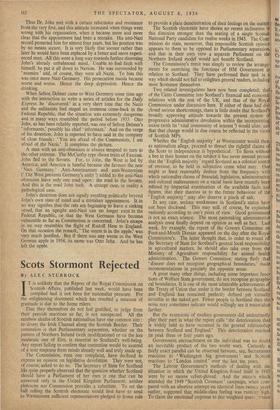The Strange Case of Dr. John
HE first major political scandal in the history of the pir Federal Republic of Germany will probably be discussed for many weeks to come at home as well as abroad. For it is, of course, a scandal of the first order if the President sf the Federal Office for the Protection of the Constitution, in hort, the head of the Federal security service, deserts to the viets. There is little doubt, if any, that Dr. John has deserted, that he went to the Soviet sector of Berlin of his own volition, that he was neither tricked nor forcibly abducted.
' Speculation has been abundant in Germany as well as abroad as to the motives, the general political significance and the consequences of Dr. John's action. As usual in such cases sensational details have been far too much emphasised. As long as Dr. John remains in the Soviet orbit, the full circum- stances of his crossing over to the Communist side will prob- ably remain in doubt. And,nothing indicates that he could or Would return to the Federal Republic. His radio broadcasts from the other side are apt to confuse rather than to elucidate the issue. But now, after the first excitement has died down, it seems appropriate to applj, sober judgement to this unfor- tunate affair.
There are two aspects to the case, one highly technical, the other truly political. On the technical side it can hardly be denied that a blow has been dealt to West Germany's secret service organisation. But then, how good was this organisa, tion? It seems that it was built up very hastily in a somewhat improvised and amateurish manner, with much overlapping between different branches and without true efficiency. The one and only conspicuous operation for which Dr. John's office was responsible proved to be a dismal failure. This was the so-called ` Aktion Vulkan,' a mass arrest of supposed Soviet henchmen in West Germany. At first much publicised as a huge success, this operation later led to the release of most of those arrested, on the ground of proved innocence or lack of evidence. It also led to official government apologies which had been made necessary by the fact that at the time of the mass arrests a complete list of names had been made known to the general public, a somewhat unusual procedure.
It was then felt in many quarters that Dr. John was too Young and too inexperienced for the task of heading an organ- isation of this kind. He was a man of forty-one when he was a_PPointed chief of the political secret service of the Federal Republic. It is now widely felt that under competent leader- ship and after thorough reorganisation the service will be far more efficient in a year's time than it ever was under Dr. John. Only part of this reorganisation will consist in seeing to it that any secrets Dr. John may have been able to divulge to the Soviets become obsolete as rapidly as possible. It may be said that Dr. John's desertion, though a considerable embarrass- 'tient at first within the secret service technique, will lead to a speedy improvement in that very technique. Thus, on the technical side the entire affair is far from being a catastrophe. The political aspect is much more interesting. Who is Dr. Otto John? His family is typically bourgeois and a number of his ancestors were civil servants. As a very young man Dr. John triad his hand in business. Later he studied law, and after completing his studies he joined the Lufthansa. He was an ardent anti-Nazi and took part in the conspiracy against Hitler, which resulted in the bomb plot of July 20, 1944. When the attempt failed he managed to escape by air to Madrid. whence he went to Lisbon and later to London. He lived in England until 1949 when he returned to Germany. During his stay in England he is reported to have been in touch with the Foreign °reign Office. He also assisted on the side of the prosecution in several of the war-crime trials, particularly in those against German generals. Nothing in Dr. John's record indicates active Communist tendencies. That he was a Soviet agent for ten or even fifteen years, as some unconfirmed reports have it, seems highly un- likely. John had a number of personal friends with left-wing convictions, which proves very little. That he has led a some- what erratic and adventurous life cannot be said to be entirely his own fault. That in the months preceding his desertion he suffered from periods of deep depression and took to drinking throws no light on his final decision.
But there is one thing which explains much and probably everything. Those who know Dr. John personally know also that he is not simply an anti-Nazi, nor simply an ardent anti- Nazi. He is a man with an anti-Nazi obsession, with an anti- Nazi complex. He sees Nazis, feels Nazis, smells Nazis wherever he goes in Germany. John is something like a McCarthy in reverse, a man with the persecution mania of the persecuted rather than of the persecutor. To explain Dr. John, Senator McCarthy's example is highly useful. For Senator McCarthy has proved beyond a doubt that anti-Communism can be driven to extremes which defeat the cause of democracy. But the same is true of anti-Nazism. The same is true of every ' anti ' which becomes an end in itself instead of being the logical and psychological consequence of constructive convictions and beliefs. Any ` anti ' which is not derived from a ` pro ' is apt to become a kind of hysteria.
But whereas McCarthy's anti-Communism looks like the ex- ploitation of a mass hysteria which the exploiter, himself not in the least hysterical, tries to abuse for his political purposes, John's' anti-Nazism is a deeply personal, very individual hysteria. It makes him see things which simply are not there, it makes him for ever imagine a Germany filled with Nazis, ruled by Nazis. To him 1954 it still—or once again-1934. He cannot get away from his mania of being persecuted and of having to persecute. This is the real John, a strange case, perhaps a sad case. He is not the only anti-Nazi who came out of the Nazi era with a somewhat twisted mind, with a distorted picture of reality. Evil things like Nazism are apt to unbalance the minds not only of their followers but also of some of their enemies. This is a phenomenon which has as yet not been sufficiently analysed. When Nazism came to an end in Germany, the anti- Nazis very naturally had their great chance. The Occupying Powers relied on the anti-Nazis. On whom else could they rely? In many instances this policy proved to be right. But were snot the Communists also anti-Nazi? And what about those with the anti-Nazi obsession, with the unbalanced minds? The policy of relying on the anti-Nazis was right in many instances and wrong in some instances, as is only natural with a policy which is based primarily on an ' anti ' and not on a pro.'
Those with the unbalanced minds who came into office com- paratively early had a good chance to retrieve their balance. They met with no resistance and with very little competition in the vacuum Which Hitler had left behind. They had both time and opportunity to judge the new Germany by her own merits and not by preconceived ideas. Not so Otto John. He returned to Germany as late as 1949 and came into office by the end of 1950. At that time there was no longer a vacuum in Germany. The Federal Republic was in existence. Nominal membership in the Nazi party no longer barred the way to office. De-nazification had practically come to an end. West Germany, by no means re-nazified, had become normalised.
When Dr. John became chief of the German security service. his appointment was debated from the very first. Some people said that the qualification of having been an active anti-Nazi in 1944 was simply not sufficient for this particular office in 1950. Others said that the part John played in the war-crime trials, where he had shown himself extremely vindictive and ` more allied than the Allies,' was not the best recommendation for a man who was expected to protect Germany and German interests. Others again spoke of his erratic career. They would have preferred a civil servant with real experience and in any case a man older and more mature than John. Some strings had to be pulled, German strings and British strings, to get John appointed. Thus Dr. John met with a certain reluctance and resistance from the very first, and this attitude increased when things went wrong with his organisation, when it became more and more clear that the appointment had been a mistake. His anti-Nazi record protected him for almost four years, but his position was by no means secure. It is very likely that sooner rather than later he would have been replaced by a better and more experi- enced man. All this went a long way towards further distorting John's already unbalanced mind. Unable to find fault with himself, he put it all down to Nazism. He was surrounded by ' enemies' afid, of course, they were all Nazis. To him this was once more Nazi Germany. His persecution mania became worse and worse. Hence the deep depression. Hence the drinking.
When Sefton Delmer came to West Germany some time ago with the instruction to write a series of articles for the Daily Express, he ` discovered' in a very short time that the Nazis and the militarists had staged an immense come-back in the Federal Republic, that the situation was extremely dangerous and in many ways resembled the period before 1933. Otto John, as has been reliably reported, was one of Sefton Delmer's ' informants,' possibly his chief ' informant.' And on the verge of his desertion, John is reported to have said in the company of close friends : You are afraid of the Communists, I am afraid of the Nazis.' It completes the picture.
A man with an anti-obsession is always tempted to turn to the other extreme. The McCarthy type shows traits of Fascism. John fled to the Soviets. For, to John, the West is led by America, and America is hateful because she favours the new ` Nazi Germany.' Anti-Americanism and anti-Westernism (` The West prevents Germany's unity ') added to the anti-Nazi obsession leave only one road open : the road to the Soviets. And this is the road John took. A strange case, in reality a pathological case.
John's desertion does not signify anything politically beyond John's own state of mind and a mistaken appointment. It in no way signifies that the rats are beginning to leave a sinking vessel, that an upright anti-Nazi can no longer exist in the Federal Republic, or that the West Germans have become vulnerable as far as Communism is concerned. John's escape in no way resembles the flight of Rudolf Hess to England. On that occasion the remark, The worm is in the apple,' was very much justified. But if there was any worm in the West German apple in 1954, its name was Otto John. And he has left the apple.



































 Previous page
Previous page